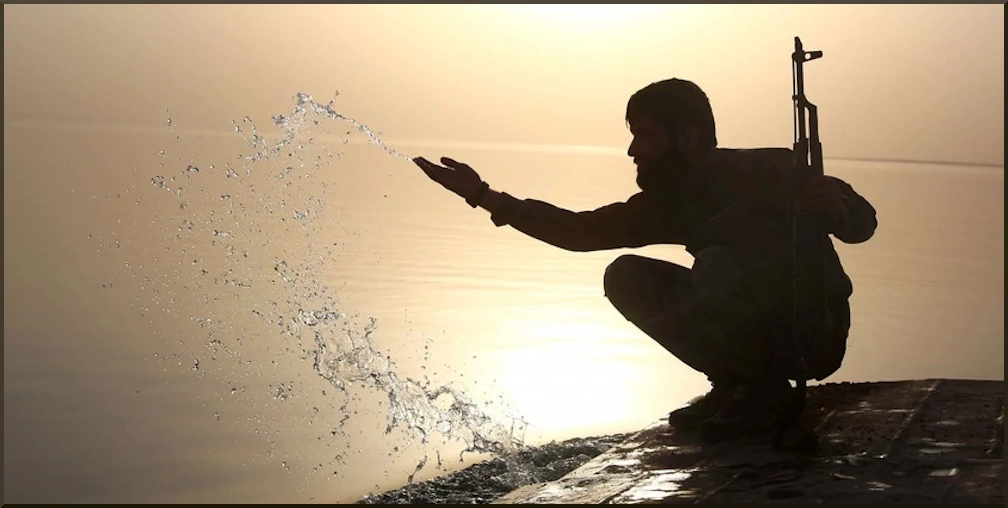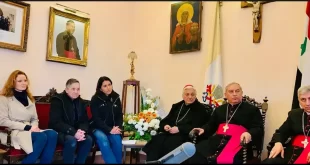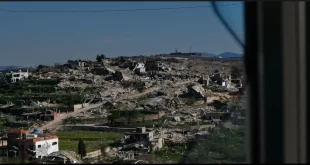from DG Geopolitics, July 27, 2023
Introduction
In the parched landscapes of the Middle East, where life clings to the rhythmic ebb and flow of water, the Tigris and Euphrates rivers course through time and territory as the lifelines of Syria and Iraq. Their journey, however, commences in Turkey, where their vital life-giving force is seized, harnessing these ancient waters to feed the hunger of energy and agricultural ambitions, embodied in Turkey’s ambitious Southeastern Anatolia Project (GAP) and the mammoth Ilısu Dam.
Yet, this story isn’t merely about the manipulation of water; it is about power, control, and a crisis echoed in the barren fields of Syria and Iraq. It’s about the urgent whisper of the rivers, growing fainter, as the lifeblood of the downstream nations is drawn away, leaving a trail of droughts, declining agricultural productivity, and economic hardships in its wake.
The stark consequence? A staggering 40 percent reduction in water flow to Syria and Iraq – a wound inflicted even before the leviathan of Turkey’s energy projects in the Euphrates basin comes fully to life. The lifeblood of these nations, their agriculture, lies disrupted and withered. Their crop yields have dwindled, plunging rural communities into the throes of food insecurity and economic despair. The ripple effect has driven migration from rural to urban, the strain on city infrastructure almost palpable.
Yet, water scarcity isn’t the only fallout of Turkey’s hydropower and irrigation endeavors. A more insidious undercurrent flows through this narrative – a unilateral approach to water resource management and dam construction, breeding tension and mistrust amongst the nations. Turkey’s use of water as a political bargaining chip, particularly in Kurdish territories, does little but fuel the diplomatic flames, further complicating an already fragile situation.
As GAP unfolds, its benefits are largely pocketed by Turkey, leaving Syria and Iraq grappling with the burden of its consequences. This tale of resource distribution echoes the wider narrative of socio-economic inequity in the region. While Turkey thrives on increased energy generation and economic prosperity, Syria and Iraq reel from the blow of water shortages and socio-economic instability. As these stark contrasts take center stage, they further erode the relationship between these nations, casting a long shadow over the prospects of regional cooperation and development.
The Watershed Moment: Iraq’s Hydropolitical Dilemma
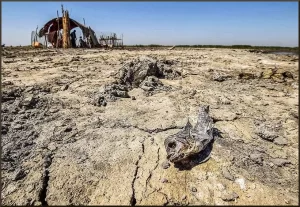 In the sun-scorched landscapes of the Middle East, water has morphed from a source of life into a pawn in geopolitical maneuvers. An understated instigator of socio-ecological turmoil. Iraq finds itself squarely in the crosshairs of this transformation, grappling with the fallout from Turkey’s hydraulic hegemony. The once mighty Euphrates and Tigris rivers teeter on the precipice of becoming mere relics of a time when water was abundant and free-flowing.
In the sun-scorched landscapes of the Middle East, water has morphed from a source of life into a pawn in geopolitical maneuvers. An understated instigator of socio-ecological turmoil. Iraq finds itself squarely in the crosshairs of this transformation, grappling with the fallout from Turkey’s hydraulic hegemony. The once mighty Euphrates and Tigris rivers teeter on the precipice of becoming mere relics of a time when water was abundant and free-flowing.
Turkey, sitting on the throne of the Euphrates and Tigris headwaters, holds the reins of these rivers’ downstream destiny. This grip has been fortified by the Southeastern Anatolia Project (GAP), a brazen venture involving 22 dams, 19 hydroelectric power plants, and an intricate web of irrigation networks. Initiated in 1977, GAP is Turkey’s masterstroke in resource control.
Among the final components of this grand project is the Ilısu Dam, an imposing hydroelectric behemoth forecasted to churn out a whopping 3,800 GWh of electricity annually. While Turkey’s energy infrastructure stands to reap substantial benefits, the consequences downstream are dire.
Data from the UN’s Food and Agriculture Organization sketches a sobering trajectory. Iraq’s per capita water availability in 1977 was around 2,400 cubic meters annually. By 2015, this figure had been more than halved to 1,055 cubic meters. Projections for 2025 predict a precipitous drop to a meager 700 cubic meters. We’re looking at a fast-approaching water crisis, conducted with unnerving precision from upstream.
The shadows of Iraq’s escalating socio-economic crises are growing longer, their root buried deep within Turkey’s unwavering water policies. A World Bank analysis underlines the potential human toll: in 2018, nearly a fifth of Iraq’s population, representing about 7 million people, relied on agriculture for their livelihood. As the rivers recede, these communities face the existential threat of unemployment and food insecurity. An exodus from rural to urban regions is a likely scenario, one that could shake the already precarious equilibrium of Iraq’s cities to its core.
Ahmed is a representation of the harsh realities of water scarcity in Iraq. The 42-year-old wheat farmer was once a proud tiller of the fertile plains of Nineveh, contributing to a region known as Iraq’s breadbasket. Yet, the worsening water crisis, a combination of record low rainfall, unprecedented temperature hikes, and upstream damming activities, pushed him into an unfortunate exodus.
Forced to abandon his ancestral land, Ahmed found himself grappling with unemployment in the urban sprawls of Mosul, a city still bearing the scars of recent conflicts. This shift was not just a change in scenery but represented a devastating loss of livelihood, dignity, and stability for Ahmed and his large family.
This mass displacement isn’t exclusive to Ahmed. The International Organization for Migration (IOM) reports that hundreds of families, who had initially been displaced due to conflict and had later returned, found themselves uprooted yet again due to the intensifying drought.
The water crisis, accentuated by falling water levels on the Tigris and Euphrates due to dam-building in neighboring Turkey and Iran, is not only a trigger for socio-economic upheaval but also a catalyst for potentially destabilizing migration patterns to cities ill-equipped to handle such an influx. The story of Ahmed’s displacement is a stark reminder of the human implications of water scarcity, underlining the urgency to address this issue not only as a diplomatic and environmental challenge but as a profound humanitarian crisis.
These rivers, once vibrant symbols of fertility, have been transformed into emblems of a looming power crisis and public health catastrophe. The decline in water flow doesn’t just jeopardize Iraq’s small, yet significant, hydropower generation; it dramatically increases the risk of waterborne diseases like cholera and diarrhea, as the concentration of pollutants in the diminished waters surges. The most vulnerable, children, bear the brunt of this emerging health crisis.
The Iraqi Marshes, the ecological crown jewel of Iraq and a vibrant testament to the region’s historical legacy, are a poignant reflection of Turkey’s water machinations. Once a lush maze of reed beds and waterways teeming with life, the marshes are now a parched skeleton of their former selves. The Marsh Arabs, inhabitants of these wetlands for millennia, are forced to witness the slow annihilation of their culture, perpetrated not by violence but by an insidious water deficit. Their ancient wisdom, preserved through generations, is being erased, consumed by the encroaching desert sands.
This grim reality has fueled a simmering cauldron of social unrest, occasionally spilling over into the public arena, as evidenced by the protests in Basra. A ticking socio-ecological time bomb, the explosion’s inevitability grows more acute with each passing day.
In the face of this impending disaster, Turkey, seemingly unmoved by international outcry or potential sanctions, continues its relentless pursuit of GAP’s completion. This is the embodiment of realpolitik in its most ruthless form, where national interests trump the potential catastrophe awaiting downstream.
To be fair, Turkey, as a sovereign nation, holds the right to harness its resources. However, there exists a fine line between strategic utilization and oppressive control, a line Turkey seems dangerously close to crossing.
Amidst this impending crisis, the glaring absence of a comprehensive transboundary water management agreement is baffling. Such an agreement is not just a diplomatic salve, it could be the lifeline millions need.
Tensions and Lack of Agreements
Turkey’s aggressive dam construction and extensive irrigation projects have fanned the flames of tension between itself, Syria, and Iraq. Though water-sharing agreements exist between Turkey and Syria, and Syria and Iraq, a comprehensive pact between Turkey and Iraq remains elusive. This absence has intensified disputes over water resources.
Past attempts at cooperation and negotiation have yielded little fruit, and no formal agreement has yet been established. This lack of transparency and equitable water-sharing policies only serves to deepen the crisis and escalate mistrust among these nations. The path forward is clear but untraveled: for these countries to chart a course away from disaster, collaboration and compromise are not just desirable, they are essential
The Iraq-Turkey MoU and Its Concealed Pitfalls
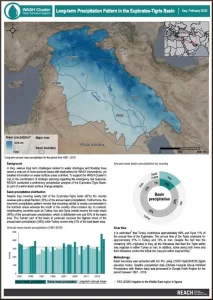 In an era dominated by intensifying geopolitical tensions and competition for resources, the memorandum of understanding (MoU) between Iraq and Turkey in 2019 carries significant implications for the region. This cooperation, intended to address water issues and foster better bilateral relations, instead reveals a complex intertwining of diplomacy, economic interests, and strategic maneuvering that demands a meticulous analysis.
In an era dominated by intensifying geopolitical tensions and competition for resources, the memorandum of understanding (MoU) between Iraq and Turkey in 2019 carries significant implications for the region. This cooperation, intended to address water issues and foster better bilateral relations, instead reveals a complex intertwining of diplomacy, economic interests, and strategic maneuvering that demands a meticulous analysis.
The MoU, borne out of diplomatic negotiations spanning several years, attempts to lay the groundwork for mutual cooperation and experience-sharing. Yet the opaque nature of its construction, and the lack of public scrutiny over its contents, raise questions over the effectiveness of this instrument in guaranteeing Iraq’s fair share of the Tigris and Euphrates waters.
The lack of an Arabic version of the MoU is a surprising oversight, given the significance of precise terminology in any legal or diplomatic document. Such an omission could lead to disagreements or misinterpretations that could compromise Iraq’s interests.
Additionally, the memorandum’s failure to reference international standards or conventions is a conspicuous omission, particularly considering Iraq’s adherence to the Convention on the Law of Non-Navigational Uses of International Watercourses from 1997. This omission leaves the agreement devoid of the context provided by globally accepted principles, thus increasing the potential for disputes and misunderstandings in the future.
Moreover, the MoU appears to limit development cooperation to “joint projects”, with a lack of clarity over what these projects may entail. The history of unilateral Turkish dam projects, such as the GAP project and the Ilisu Dam, raises concerns over the potential for this phrase to be leveraged for strategic advantage by Turkey.
The proposed construction of three new dams, reportedly located within Iraqi borders but to be built in partnership with the Iraqi government and managed jointly, raise further questions. The Iraqi water strategy does not call for new dams, suggesting that these projects are driven by Turkish interests.
Three points of Turkish interest emerge from this:
Turkey’s economic influence, with Turkish companies poised to secure substantial profits from these projects.
The strategic use of dams as security barriers, an approach Turkey has historically utilized.
The manipulation of this agreement to further their own water resource objectives, including the operation of the Ilisu Dam and other projects along the Tigris and Euphrates rivers.
Conspicuously absent from the MoU is any commitment from Turkey to refrain from building additional dams without coordination with Iraq, raising concerns about Iraq’s ability to safeguard its water security.
The repeated references to Turkish companies underscore Turkey’s keen interest in penetrating the Iraqi market, especially in the lucrative water management sector. Furthermore, the focus on bilateral dealings with Iraq and the reduction of Syria’s role signals a potential strategy to isolate and weaken Syria’s bargaining position, thereby fortifying Turkey’s influence in regional water resource management.
In essence, the document reveals a complex blend of diplomacy, economics, and strategy. The MoU ostensibly focuses on cooperation, but beneath the surface, it hints at a distinct possibility of power asymmetry favoring Turkey. Iraq needs to ensure that any agreement it signs respects its national interests, aligns with its long-term strategy, and adheres to international standards, to ensure the sustainable and equitable utilization of shared water resources.
The Specter of Desertification: Turkey’s Hydro-Imperialism and the Withering of Syria
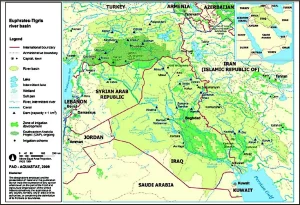 When the cradle of civilization gasps for water, and the ancient rivers that once nurtured it are held hostage by cold, calculating hydro-hegemony, the reverberations echo through history. As if etched on the dried-out riverbed of the Euphrates, Turkey’s water policies sketch a stark tale of suffering and survival, particularly for its Southern neighbor, Syria.
When the cradle of civilization gasps for water, and the ancient rivers that once nurtured it are held hostage by cold, calculating hydro-hegemony, the reverberations echo through history. As if etched on the dried-out riverbed of the Euphrates, Turkey’s water policies sketch a stark tale of suffering and survival, particularly for its Southern neighbor, Syria.
The Euphrates, the life-giving artery that once coursed vigorously through Syria’s heart, now trickles pitifully. Turkey’s unyielding chokehold on its flow has set in motion a humanitarian crisis of epic proportions. Northeast Syria, a region under the Kurdish-led Autonomous Administration of North and East Syria, finds itself in the eye of this storm. Turkey has throttled the Euphrates’ flow to a paltry 200 cubic meters per second, a stark contrast to the agreed-upon 500 cubic meters in the Syrian-Turkish agreement. This brazen violation has led to the impairment of the Tishrin hydroelectric dam, casting an ominous shadow over electricity generation.
Notwithstanding the geopolitical power play, the real casualties of this hydrological war are the humble farmers. Agriculture, the heartbeat of the region’s economy, now stands imperiled on the brink of annihilation. Once teeming with life, the fertile plains along the Euphrates are now the parched specter of a waterless world. It’s a poignant paradox: the very waters that once blessed these lands with life are now withheld, leaving behind a devastating trail of ruin.
But the tyranny of Turkey’s water policy doesn’t end with uprooting the economic mainstay. It’s a relentless juggernaut that steamrolls over the bread and butter issues – quite literally. Food security, precariously poised due to the relentless civil war, now totters on the brink of collapse. Crop degradation, amplified by livestock loss, has sent food prices skyrocketing, while the specter of famine begins to take form in the arid Syrian landscape. Over 5 million souls in Northeast Syria find themselves tethered to the Euphrates, their life and survival hanging by the thread of its dwindling waters.
The human cost of Turkey’s water aggression is sobering. Yet, the wounds inflicted run deeper, seeping into the public health fabric. The plummeting water levels, while tragic in their own right, also herald a public health nightmare. Diseases once considered eradicated, like cholera, hepatitis, and typhoid fever, are rearing their heads again. A grim testament to this unfolding health crisis is the fact that a staggering number of water stations along the Euphrates are critically affected, stoking a health crisis in governorates like Hasakah, Raqqa, Deir ez-Zor, and Aleppo.
Moreover, Turkey’s chokehold on the Euphrates has set the stage for an escalating ecological disaster. Land that was once fertile is now succumbing to desertification, accelerating at a rate that can only be described as an ecological time bomb. Drought cases and periods in 2021 spiked by an alarming 29 percent compared to the past two decades. The land, once celebrated as the cradle of civilization, now stands on the precipice of turning into a sprawling desert.
Amid this intensifying crisis, Turkey not only remains unmoved but appears to be flexing its muscles even more. Its threats of a new military offensive against the Kurdish-dominated regions of Northeast Syria are a chilling testament to Ankara’s unyielding aggression, adding an unbearable weight of anxiety and uncertainty on an already beleaguered population.
A river that once symbolized life has now become an instrument of despair, thanks to Turkey’s unflinching pursuit of hydro-hegemony. While its quest for national interests may be understandable to some extent, the flagrant disregard for the water needs of its neighbors is simply inexcusable. It’s time the international community moved beyond the realm of rhetoric and took decisive actions to hold Turkey accountable for its reckless actions.
1987 Turkey-Syria Water Protocol
The year 1987 saw the genesis of a crucial protocol that was inked with an aim to foster peaceful cohabitation between the riparian nations of Turkey, Syria, and Iraq. The heart of the matter was the distribution of the Euphrates River water, which has its source in the Eastern Anatolia region of Turkey and meanders through Syria and Iraq before culminating its journey in the Persian Gulf. This agreement had a simple prescription — Turkey was mandated to ensure a flow of at least 500 cubic meters per second at the Turkish-Syrian border.
The treaty appeared solid on paper, serving as a testament to cooperative intentions and a collective pledge to maintain the ebb and flow of shared natural resources. Yet the cascade of history has demonstrated that in the arena of geopolitics, good intentions often fall prey to the pragmatic pursuit of national interests.
Turkey, a burgeoning regional power with a rapidly growing economy and population, embarked on a path of unprecedented hydro-engineering expansion, a pivotal component of which is the Southeastern Anatolia Project, or GAP. This project, a system of 22 dams and 19 power plants, represents a mighty testament to Turkish industrial and technological prowess, a literal reshaping of the land to bend the waters to Turkey’s will. The Atatürk Dam, the centerpiece of this grand project, alone has the capacity to hold a year’s worth of Euphrates flow.
Yet, as the mighty Euphrates courses through Syria and Iraq, it brings with it not just life-giving water but the memory of its capture upstream. The hegemony of Turkish dams curtails the river’s flow, with dire consequences for the nations downstream. The ostensibly assured 500 cubic meters per second flow at the Syrian border becomes a mirage in the desert as Turkey harnesses the Euphrates, impounding it within the concrete and steel confines of its dams.
The situation downstream in Syria and Iraq reveals a stark picture: parched fields where bountiful crops once grew, withering livestock, and beleaguered communities that once thrived along the riverbanks. Yet, this is more than a tale of ecological calamity; it is a narrative of a world where water, a shared resource and common heritage, is harnessed as a tool of power and control.
Indeed, the 1987 protocol promised a joint, harmonious management of a shared resource. Yet, in its implementation, it has evolved into an emblem of disparity and contention. It is a stark reminder that the governance of natural resources, particularly those traversing national boundaries, is often less about equity and justice and more about the exercise of power. The Euphrates is not just a river; it has become a geopolitical battleground where the lives and futures of millions hang in the balance, teetering between a thirst for progress and the thirst of the parched earth.
The ethical riddle we must grapple with is this: In our quest for progress, should the rivers of the world, the veins of our Earth, be shackled in concrete and steel? Or can we, as custodians of this planet, find a path that respects both the needs of development and the rhythms of the natural world?
It is high time that the international community awakens to the symphony of the Euphrates, listens to its tales of woe, and calls for a review of the 1987 agreement, urging Turkey to uphold not just the letter but the spirit of this crucial protocol. The Euphrates, after all, is more than just a river; it is a lifeline, a shared heritage, a testament to the intertwined destinies of the nations through which it flows.
Political and Economic Machinations: Unraveling the Threads of Turkey’s Water Policies
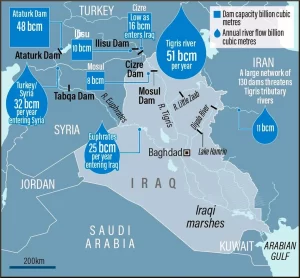
While the exterior of Turkey’s water management edifice appears steeped in environmental concerns and developmental ambitions, a closer look reveals a lattice of political maneuvering and economic calculations. Far from being purely a quest for sustainability or agricultural prosperity, Turkey’s water policies, when unraveled, emerge as conduits for political leverage and economic gains.
This dance of power and wealth becomes palpably evident in Turkey’s engagement with Syria and Iraq. For Ankara, water negotiations are not confined to the realm of ecology or humanitarianism. Instead, they serve as the political chessboard on which Turkey maneuvers to gain cooperation from Syria and Iraq on contentious issues. Among these issues, the matter of Kurdish territories looms large. Using the throttle of water control, Turkey pushes for favorable stances from its southern neighbors regarding Kurdish autonomy and militancy. Thus, the rivers that crisscross these nations, instead of fostering unity and shared prosperity, are harnessed as weapons in a game of geopolitical brinkmanship.
The dynamics of Turkey’s water policies are also deeply intertwined with the veins of economic interest. Turkish companies, with eyes set on the lucrative Iraqi market, have embarked on numerous investment projects. These ventures, while seemingly economic in nature, have far-reaching implications for the water-sharing debate. By embedding themselves in Iraq’s economic fabric, these companies strengthen Turkey’s grip over the negotiation table, potentially skewing water-sharing solutions in favor of Turkish interests.
This intricate intertwining of economic gains and political leverage transforms Turkey’s hydro-strategies into a multi-pronged instrument. On one hand, it yields developmental dividends within Turkish borders, bolstering agricultural and energy sectors. On the other hand, it equips Turkey with potent bargaining chips in regional politics, while simultaneously opening doors for economic expansion.
The panorama of Turkey’s water policies, therefore, extends far beyond the rivers and dams that visibly define it. The implications ripple out, influencing the political tides and economic currents that shape the wider Middle Eastern landscape. As we continue to dissect this issue, it becomes increasingly evident that the crisis at hand is not merely environmental, but a potent mix of politics, economy, and ecology. A holistic resolution, hence, requires not only ecological sensitivities but also a careful navigation of the undercurrents of power and wealth.
Navigating to Sustainability: Conclusions and a Path Forward
As we navigate the turbulent currents of this unfolding crisis, it’s crucial to steer the dialogue from conflict to cooperation, from exploitation to sustainability, and from dominance to shared responsibility.
Coping with the water shortage in Syria and Iraq necessitates sincere, transparent negotiations between Turkey, Syria, and Iraq. This includes not only reassessing water-sharing agreements but also pioneering a holistic water management framework that can cope with the exacerbating factors of growing populations and shifting meteorological patterns.
Turkey, as the nation with the most control over the Tigris and Euphrates, has a critical role to play in this process. The country’s ambitious development and hydro-engineering projects have had undeniable economic benefits, but they have also led to mounting tensions over water rights. It’s imperative for Turkey to take the lead in promoting sustainable water use, engaging with neighboring countries in a spirit of cooperation and respect, and seeking balanced solutions that address the needs of all parties involved.
Furthermore, this approach could serve Turkey’s broader geopolitical interests. Establishing fair and transparent water-sharing agreements would be a tangible demonstration of goodwill towards its neighbors, which could help ease regional tensions. Specifically, if Turkey is serious about reconciliation with Syria and Iraq, ensuring equitable access to water could foster mutual trust, paving the way for increased cooperation on shared challenges, such as Kurdish insurgency. By securing its ‘water relations’, Turkey might find it can better secure its borders and foster regional stability.
It’s essential for regional powers to step in and mediate the discourse, advocate for sustainable water management practices, and support the affected nations with technical expertise and funding. Water should no longer be seen as a source of contention but as a wellspring of cooperation.
It’s essential for the international community to step in and mediate the discourse, advocate for sustainable water management practices, and support the affected nations with technical expertise and funding. Water should no longer be seen as a source of contention but as a wellspring of cooperation.
Innovative solutions such as adopting advanced irrigation technologies, rainwater harvesting, wastewater recycling, and desalination should be explored and implemented where possible. These could significantly reduce the stress on the Tigris and Euphrates rivers, allowing for a more equitable and sustainable allocation of water resources.
Furthermore, educational initiatives should be introduced to promote a culture of water conservation and raise awareness of the critical role each individual can play in water stewardship. These efforts can help cultivate a mindset that understands and respects the intrinsic value of water beyond its economic and strategic importance.
Turning back to the story of Ahmed, a farmer from the arid plains of Mesopotamia whose once verdant fields now stand parched under the harsh sun, the urgency of this crisis becomes all too real. The fading echo of the mighty Tigris in the background is a chilling testament to the threat that looms not only over Ahmed’s livelihood but the survival and prosperity of millions like him.
The heart of this discourse is not about the control of resources, it’s about our shared humanity and our collective responsibility towards our planet and future generations. Water is a lifeline, a heritage, and a testament to the interconnected fate of the nations through which it flows. As we sip the last drops of this vital resource, the question we must ask ourselves is whether we want to be remembered as the generation that allowed rivers to run dry or as the one that breathed life back into them.
In conclusion, a shared commitment to sustainable water management can be the key to unlocking regional stability and avert potential conflicts arising from water scarcity in the future. It’s time to redefine our relationship with water – not as a commodity to be hoarded and exploited but as a shared resource to be managed with care, respect, and foresight. After all, water is life, and like life, it should be celebrated, protected, and shared in the spirit of global kinship.
-Sarah, the Donbass Devushka
 Syria Support Movement solidarity with the Syrian people
Syria Support Movement solidarity with the Syrian people

